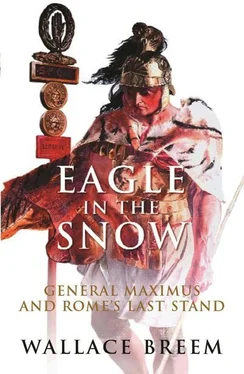I stared at him, speechless with shock.
“It is true,” he said. “I would not joke on such a matter—not to any man. For those who do not profess his faith the road to high office in the empire is now barred for ever.” He paused. He said, coldly, “Were I still a Roman I swear I would not serve a man who passes such unjust laws.”
I remained silent.
He looked at my face, half stretched out his hand and then let it fall to his side. “Oh, Maximus, do not look like that. Though you walk through the seven gates of our faith, still you will not know which way the wind may blow you.”
I said nothing and he stared at the ground with blank eyes. Then he looked up and tried to smile. “Will you drink with me? Just once, for the sake of forgotten things.”
“Of course. Willingly and with all my heart.”
He went into the tent and came out with an amphora and two drinking cups. “This came from a wrecked ship,” he said. “I kept it until now, thinking to drink it on some great occasion. I have not tasted your wine in years.”
I poured the libation and said alone the words that we had been used to saying together in another life, while he watched without comment. It was like a dream, this meeting, and I wondered how it would end. I raised my cup and said to him, “May you be happy.”
He half smiled. He said, “You have a wife and a home and a people: all the things you wanted except one. Is the dream good now that it has become reality?”
“I like to think so.”
“I had a dream, too, but it was conceived in hate.”
“I know that.”
“Is that why it failed, do you think?”
“Perhaps. Yet it nearly succeeded. How did you do it?”
He poured the dregs from his cup onto the sand and shaded his eyes. “By hard work.”
I thought of all that it must have taken. The endless talks by smoky fires in rock-bound valleys that we had never seen; the ruthless patience required to smooth over jealousies and blood feuds that were old when Agricola built his forts; the sheer, hard, grinding work of welding tribes, clans and sects into an organised whole, equipped, prepared and willing to follow a single plan, to obey a single order and to strike the aimed blow in the right place at the right time.
“No Roman could have done it.” I did not realise that I had spoken aloud.
“But I share their blood.”
“I had forgotten.”
“Even that was not enough. Village after village would not have me. I was a stranger, an outcast, a man with no shadow. But one night I came to a secret place where the priests of the tribe celebrated their mystery. It was a night of storm and lightning; a night of great violence that would make even a Roman believe that the gods he had forsaken were angry with him. They saw the brand that you know upon my forehead, they saw my head with no hair, and they saw that I had the look of a man who has gazed into a great darkness. Their priests gave me food and shelter without a word, and in the morning they sent me the High-Priest’s daughter to be my servant. From her I learned that they believed I was a god.”
He paused and looked up. “After that the work began that I had made my purpose.”
I shivered.
He said, “It is I who shiver now. I knew that we had failed even before we began. In that night of waiting, while I lay in the heather and looked at the walls of your fort, I had a great feeling of coldness inside me. For the first time since I had met the High-Priest’s daughter the warmth left me and I was cold again. I felt colder still when I stood triumphant inside your shattered walls. She was so far away. I knew then that I did not care whether I lived or died, whether I won or lost. I went on with my purpose but it had no meaning now, and when the tribes broke up to plunder and to quarrel I no longer cared.”
He threw his cup onto the ground and tried to smile.
I said, “And what do you do now?”
“I have been waiting for that ship,” he said. “For five days I have been waiting.” He smiled with his teeth. “A man who fails is not popular. After it was over I crossed to Hibernia and lived there. But it was always damp and I was always so cold—here.” He touched his belt briefly. “In the end I returned to Caledonia. But I could not bear to go back to those mountains again and live alone, inside myself. So, I set sail in a Saxon ship for a Saxon land. They are still my friends.” He spoke with a defiant pride. “Perhaps I shall find another purpose somewhere, some day, that will not break in my hands.”
Above us a gull wheeled in the sky and cried shrilly; the guide sat motionless, cross-legged by the tent; and the sea rolled upon the beach. He put his hand to the mark on his forehead and said, “We both carry a burden upon our backs, but mine is heavy with things undone.”
I could have cried out to him then and repeated the old offer of the villa in Gaul; but I knew that he would refuse. He had too much pride, too much bitterness, too much hate. There was so much between us that lay in a golden past and that we could not remember without intolerable pain. So I kept silent.
He spoke to my guide, who answered him and nodded, pointing briefly at the tent. Then he turned to me, his face suddenly like stone.
“When the tide turns I shall sail. But you must go now.”
“You have not asked your question.”
“I kept it till the last, hoping that I would not need to ask it.”
“Do you need to?”
“No. But I must ask it all the same.”
I waited.
He said, “What happened to her. What happened to my High-Priest’s daughter?”
“She died.”
“You killed her.”
“Yes.”
He said, “And for that I could kill you, even now, though you hold a green branch in your hand. But I will not. Instead I will give you a warning. Stay here where it is safe. Stay in this island which is now your home.”
“Why?”
“I cannot answer that, Maximus. But on the day that you become the father of your brother, and the sun stands in the sign of Capricorn, you will wish that you had stayed upon the Wall.”
I shivered, not understanding what lay beneath the words I knew so well—I who had been present at his pain and his re-birth, as he had been at mine.
“Shall I see you again, Julian?”
“Do you want to?”
I was silent.
He said, “That is a question I should not have asked. Yes, I think we shall meet again.”
He raised his hand in a salute of farewell and I acknowledged it before turning away.
My men were sitting huddled round a fire when I came to them and Quintus, wrapped in his white cloak, was walking his horse up and down.
“Well,” he said. “What did he want?”
“I was just saying goodbye to an old friend.”
AELIA COUGHED AND said, huskily, “Shall we ever leave Borcovicum, do you think?”
Quintus rattled the dice again and smiled bitterly. “The Wall is a place only for forgotten and disgraced men. But at least the frontier is quiet and we may live in peace.”
I said nothing. My unfulfilled dreams hurt no longer; the seasons passed, one like another; and I was content that it should be so.
Then an imperial courier rode up from the south with the news that Theodosius had died at last. I paraded my men, as in the old style, and with the snow falling upon our battered armour and our dulled swords I told them that the child, Honorius, was now emperor and bade them take the oath of allegiance. They did so, four or five hundred shabby men in worn cloaks, whose hands, toughened only by farming now, had not held a sword in years; while the bored sentries on the guard-walk turned their backs upon the white dumbness of the heather and leaned upon their shields to watch a ceremony that once—performed by the legions—might have made or broken an emperor.
Читать дальше












